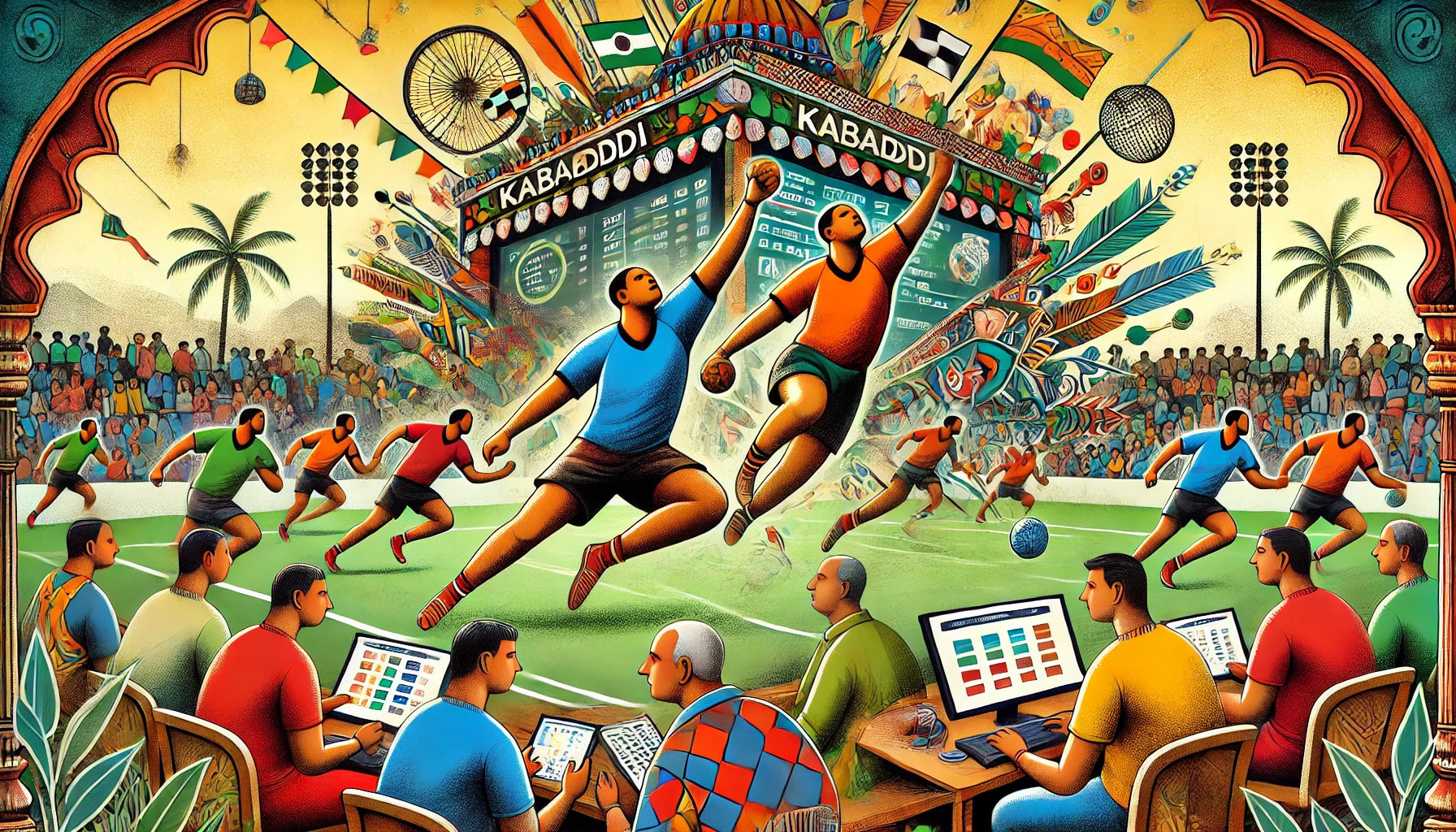The Rise of Kabaddi Betting in South Asia: A Cultural Phenomenon in the Making
Kabaddi, a traditional South Asian sport, has seen a dramatic rise in popularity, not just as a spectator sport but also in the world of sports betting. What was once a game deeply rooted in rural traditions has now evolved into a professional sport with a massive following. The introduction of professional leagues like the Pro Kabaddi League (PKL) has propelled the sport onto a global stage, making it one of the fastest-growing sports in South Asia. This transformation has also spurred a rise in betting markets, as Kabaddi matches attract bettors who are eager to engage with this high-intensity sport.
The sport’s simplicity and physical demands make it appealing to a wide audience, which has, in turn, contributed to the growth of betting. For many, Kabaddi holds cultural significance, representing a connection to their heritage. With the professionalization of the sport, it now offers a blend of tradition and modern competition, making it a unique phenomenon. This combination of cultural significance and modern appeal has created an ideal environment for the growth of Kabaddi betting, with both local and international bettors showing increasing interest in the sport.
The Cultural Importance of Kabaddi in South Asia
Kabaddi has long been a cultural symbol in South Asia, particularly in India, Bangladesh, and Pakistan. It is a game that dates back thousands of years, with its roots deeply embedded in rural communities. Historically, Kabaddi was played as a way to develop physical strength, agility, and strategic thinking, often used as a training exercise for warriors. The game was passed down through generations, becoming a cherished activity in rural villages, where it was often played during festivals and community gatherings.
Origins and Traditional Roots of Kabaddi
The origins of Kabaddi are believed to be linked to ancient India, where it was played as a sport of endurance and tactical skill. It was known for its simplicity—requiring no equipment except for a flat playing surface—and its emphasis on teamwork and strategy. As a game of “attack and defense,” Kabaddi required players to hold their breath and touch opponents while chanting “Kabaddi, Kabaddi” continuously, showcasing their stamina and mental toughness. This cultural heritage is still evident in the way Kabaddi is revered today, especially in rural parts of India and Bangladesh, where the game is considered a source of pride and identity.
Modern Evolution and Growth as a Professional Sport
In recent decades, Kabaddi has evolved into a professional sport, largely driven by the launch of the Pro Kabaddi League in 2014. This league, modeled after popular sports leagues like the Indian Premier League (IPL), brought the game into the mainstream, attracting corporate sponsors, television deals, and a new generation of fans. The professionalization of Kabaddi has not only transformed it into a highly competitive sport but has also contributed to its growing global audience. With professional teams, international players, and an organized league structure, Kabaddi is now a prominent fixture in the sports calendars of South Asia, and its cultural importance has only deepened with this modernization.
Key Factors Contributing to the Growth of Kabaddi Betting
Several factors have contributed to the rise of Kabaddi betting, with the sport’s transformation into a professional league and increasing media coverage playing pivotal roles.
The Role of Media Coverage and Live Broadcasting
One of the key drivers behind the growth of Kabaddi betting is the extensive media coverage and live broadcasting of matches. Kabaddi was traditionally played in rural settings with limited exposure to larger audiences. However, the advent of live broadcasting, particularly with the launch of the Pro Kabaddi League, has given Kabaddi a much-needed platform to reach millions of viewers across South Asia and beyond. Major sports channels now televise matches live, and digital platforms offer streaming services, allowing fans to follow their favorite teams and players from anywhere in the world.
This increased visibility has fueled the betting market, as fans and bettors alike are drawn to the sport’s fast-paced action and the excitement of live match results. Betting platforms have capitalized on this by offering odds on Kabaddi matches, making it easier for bettors to engage in real-time wagering. The wide availability of information about teams, players, and match statistics has also enhanced the appeal of Kabaddi betting, making it an accessible and informed betting market.
Rise of Professional Leagues Like Pro Kabaddi
The establishment of professional leagues, particularly the Pro Kabaddi League, has been another major factor in the rise of Kabaddi betting. The league’s structured format, featuring teams from various regions, high-profile players, and international talent, has elevated Kabaddi from a local game to a professional sport. With sponsorships, celebrity endorsements, and corporate backing, the PKL has turned Kabaddi into a lucrative industry, attracting millions of fans and bettors.
The league’s success has also created more betting opportunities, with bettors placing wagers on various aspects of the game, such as match winners, point spreads, player performance, and tournament outcomes. The introduction of betting markets for Kabaddi has allowed bookmakers to tap into a new audience, further expanding the sport’s reach. As Kabaddi continues to grow as a professional sport, the betting markets will likely see continued expansion, offering bettors more ways to engage with the game.
Top 5 Most Popular Kabaddi Leagues and Tournaments for Bettors
Kabaddi has become a prominent sport with various leagues and tournaments drawing significant attention from both fans and bettors. Here are the top 5 Kabaddi leagues and tournaments that offer the most betting opportunities:
- Pro Kabaddi League (India)
The Pro Kabaddi League (PKL) is the most popular Kabaddi league, attracting millions of viewers and bettors each season. With its structured format, top-tier teams, and high-caliber players, the PKL has become the centerpiece of Kabaddi betting. - Bangladesh Kabaddi League
The Bangladesh Kabaddi League has been gaining traction as Kabaddi’s popularity continues to grow in Bangladesh. This league offers exciting matchups and has its own dedicated betting markets, attracting local and international bettors alike. - Asian Kabaddi Championship
The Asian Kabaddi Championship brings together the best teams from across Asia, providing a platform for regional talent to compete at the highest level. This tournament is a major event for bettors, as it features some of the most competitive matches in the sport. - South Asian Games Kabaddi Tournament
As part of the larger South Asian Games, the Kabaddi tournament features national teams from across the region. The tournament’s high stakes and national pride make it an exciting event for both fans and bettors. - Kabaddi World Cup
The Kabaddi World Cup is the pinnacle of international Kabaddi, where teams from all over the world compete for the title. With high-profile matches and international betting markets, the World Cup is a must-watch event for Kabaddi enthusiasts and bettors alike.
These leagues and tournaments not only showcase top-tier Kabaddi talent but also provide a wide range of betting options, making them popular among both casual and serious bettors.
The Impact of Kabaddi Betting on Local Economies and Communities
Kabaddi betting has a significant impact on local economies and communities, particularly in regions where the sport holds cultural importance. The growth of Kabaddi as a professional sport has led to an increase in sports-related tourism, job creation, and economic activity in host cities and rural areas where the sport is traditionally played.
Employment Opportunities in the Betting Industry
As Kabaddi betting continues to grow, so do the employment opportunities associated with it. The betting industry, which includes bookmakers, betting platforms, and customer service representatives, has seen an increase in demand as more people place wagers on Kabaddi matches. This growth has created jobs, particularly in regions where Kabaddi is popular, contributing to the local economy. Additionally, the rise of online betting platforms has generated technical and operational roles in the tech industry, further diversifying employment opportunities.
Boosting Revenue Through Sports Tourism
Kabaddi tournaments and leagues attract not only local fans but also tourists who travel to watch live matches. This influx of tourists boosts the hospitality, food, and retail sectors in the host cities, creating a ripple effect of economic growth. Furthermore, regions known for their traditional Kabaddi heritage benefit from increased visibility and tourism, as the sport draws visitors interested in experiencing the cultural roots of Kabaddi.
Overall, the rise of Kabaddi betting has provided economic opportunities for communities across South Asia, helping to stimulate local economies while promoting cultural tourism.
Challenges and Opportunities for Kabaddi Betting in the Future
Kabaddi betting presents both challenges and opportunities for growth in the coming years. One of the main challenges is ensuring the integrity of the sport, as the rapid growth of betting markets may lead to concerns over match-fixing and other unethical practices. Regulatory bodies will need to work closely with betting platforms and sports organizations to maintain transparency and fairness in the betting process.
On the other hand, Kabaddi betting offers numerous opportunities for expansion, particularly in the digital space. The rise of mobile betting apps and online platforms presents a chance to reach a wider audience, making Kabaddi betting more accessible to people across South Asia and beyond. Additionally, as Kabaddi continues to gain international recognition, there is potential for the sport to enter new markets, offering betting opportunities on a global scale.
In summary, while Kabaddi betting faces challenges related to regulation and integrity, the future holds exciting prospects for continued growth and innovation in the industry.










